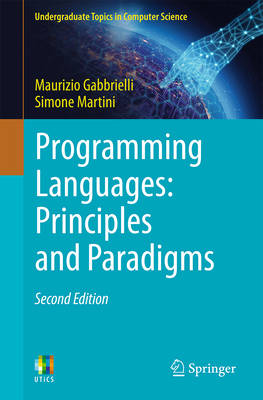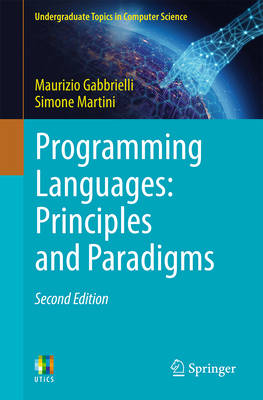
- Afhalen na 1 uur in een winkel met voorraad
- Gratis thuislevering in België vanaf € 30
- Ruim aanbod met 7 miljoen producten
- Afhalen na 1 uur in een winkel met voorraad
- Gratis thuislevering in België vanaf € 30
- Ruim aanbod met 7 miljoen producten
Omschrijving
This textbook is a thorough, up-to-date introduction to the principles and techniques that guide the design and implementation of modern programming languages.
The goal of the book is to provide the basis for a critical understanding of most modern programming languages. Thus, rather than focusing on a specific language, the book identifies the most important principles shared by large classes of languages. The notion of 'abstract machine' is a unifying concept that helps to maintain an accurate and elementary treatment. The book introduces, analyses in depth, and compares the imperative, object-oriented, functional, logic, concurrent, constraint-based, and service-oriented programming paradigms. All material coming from the first English edition has been updated and extended, clarifying some tricky points, and discussing newer programming languages. This second edition contains new chapters dedicated to constraint, concurrent, and service-oriented programming.
Topics and features:
- Requires familiarity with one programming language is a prerequisite
- Provides a chapter on history offering context for most of the constructs in use today
- Presents an elementary account of semantical approaches and of computability
- Introduces new examples in modern programming languages like Python or Scala
- Offers a chapter that opens a perspective on applications in artificial intelligence
Conceived as a university textbook, this unique volume will also be suitable for IT specialists who want to deepen their knowledge of the mechanisms behind the languages they use. The choice of themes and the presentation style are largely influenced by the experience of teaching the content as part of a bachelor's degree in computer science.
Specificaties
Betrokkenen
- Auteur(s):
- Uitgeverij:
Inhoud
- Aantal bladzijden:
- 562
- Taal:
- Engels
- Reeks:
Eigenschappen
- Productcode (EAN):
- 9783031341434
- Verschijningsdatum:
- 15/10/2023
- Uitvoering:
- Paperback
- Formaat:
- Trade paperback (VS)
- Afmetingen:
- 156 mm x 234 mm
- Gewicht:
- 807 g

Alleen bij Standaard Boekhandel
Beoordelingen
We publiceren alleen reviews die voldoen aan de voorwaarden voor reviews. Bekijk onze voorwaarden voor reviews.











